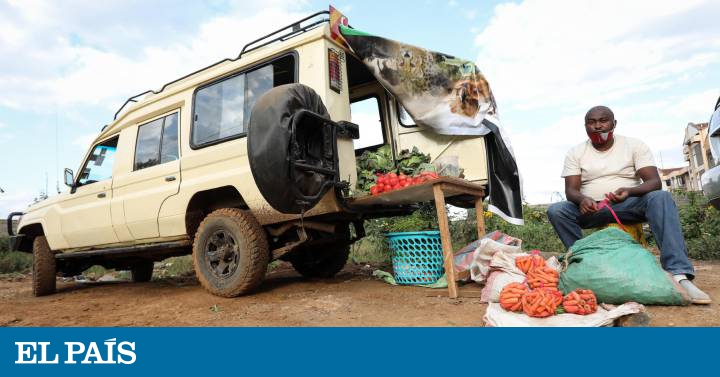Last February, Chinese tourists first mentioned the coronavirus to Kenyan safari guide Michael Kimani. Five months later, the pandemic has forced him to turn his SUV into a mobile fruit and vegetable stand, as well as hundreds of colleagues with whom he toured the savanna.
MORE INFORMATION
- The Governor of Nairobi 'bathed' in gold that distributes cognac against the coronavirus
- A false coronavirus and the reason for journalism in Africa
- The lives shaken in the city of stony lands
"Some Chinese tourists told us that there was a disease in their country called corona, they even gave us masks, but we took it as a joke. We never believed that it could be something so disastrous," explains Kimani, 38, while protecting a dozen cabbages under an advertising canvas decorated with a lion. "The sun doesn't sit well with them," he muses.
A month later, on March 12, the Kenyan government declared its first case of covid-19; on the 25th, it prohibited air transport and, 48 hours later, it plunged the country into a night curfew that ended any idle escape. Tourism, and with it many of the two million jobs that supported this lucrative industry, disappeared from the map.
"That was the first time I heard about the coronavirus and the last time I had money in my pockets," sums up this father of three children, who in mid-April - and fed up of doing nothing - decided to get up early again, but not to looking for cats, but to buy vegetables wholesale in rural Nyandarua county and then sell them in Nairobi as the only way to survive.
Not even to buy potatoes
The pandemic threatens to drag 58 million people into extreme poverty in sub-Saharan Africa alone, according to data from the World Bank, as well as a previously growing and enterprising middle class of 170 million Africans (14 % of the population of the continent).
"We are on our knees, about to collapse and perish," says Salim Ahmed Omar, 50, the founder of the now spooky Safari Exposure tour agency, based in Nairobi and where five other people worked. "In March and April I paid them their entire salary; in May, half; and in June, nothing," laments Ahmed, who estimates at 31,000 euros the losses only from the reserves he had closed until September.
With no safaris, there is also no job for the many non-contract drivers on whom agencies like yours depend, who diligently pick up foreign tourists at Nairobi's Jomo Kenyatta airport to plunge them hours later into the most coveted African savannahs or summits.
Martin Wanjohi, 48, the father of three, was one of them: Dedicated to tourism since 1996, his dismembered Land Cruiser - which has had six rear seats removed - now transports potatoes, onions, and tomatoes through the dusty streets of Ruai. , a neighborhood in eastern Nairobi, where hopefully he gets back home on about 500 shillings a day (four euros).
"That big pile of potatoes alone costs about 500 shillings," explains Wanjohi pointing to a plastic bucket that rests on the floor, "but people can't afford them."
"They take small potatoes and they ask you to leave it cheaper," he continues. And he says that in 2019 he also asked for a loan for a second vehicle and, along with other drivers, he bought a plot to build a house for himself.
"There is no hope"
Kenya has already lost 667 million euros this year due to the collapse of the hospitality sector, the Minister of Tourism, Najib Balala, detailed on June 29, who underlined the need to invest in infrastructures, which support low-intra-African tourism cost, and to promote the domestic.
"This is a unique opportunity to encourage Africans to get to know and travel within Africa," the African Union (AU) Commissioner for Infrastructure and Energy, Amani Abou-Zeid, said in a videoconference last July. the agency's efforts to create a single African passport.
"Let's be realistic. Local tourism? How many people are there salaried? We are talking about local tourists when people cannot even buy bread," Ahmed said, hopeful because the government announced on July 6 the resumption of flights. national and international in the coming weeks, but aware that it will not be enough to save the industry.
"It is our nature, we carry it by default, as human beings we want to travel," adds this businessman graduated in Tourism, "especially when you are locked somewhere, (...) but the question is whether or not we can afford it."
In turn oblivious to the final solution, Wanjohi goes back in time and recalls in a rush how during the post-electoral violence that shook Kenya in 2017 tourism suffered for months; as well as by the Gulf War (1990-1991) or the attack of September 11, 2001 (9/11) against the Twin Towers in New York.
"Yes, even after 9/11 we received few American clients, but Russians, Canadians, British, Spanish, Germans arrived," lists this guide to safaris turned fruit bowl, but "now, however, there is no hope. Not only here. , but all over the world ".
"In Europe, our clients have lost relatives, jobs, they have lost the people they loved. Even if the closure of borders and airports is over, I don't know how many will be able to travel," he asks, despite wishing strongly that soon open the heavens.
You can follow PLANETA FUTURO on Twitter and Facebook and Instagram, and subscribe here to our newsletter.









